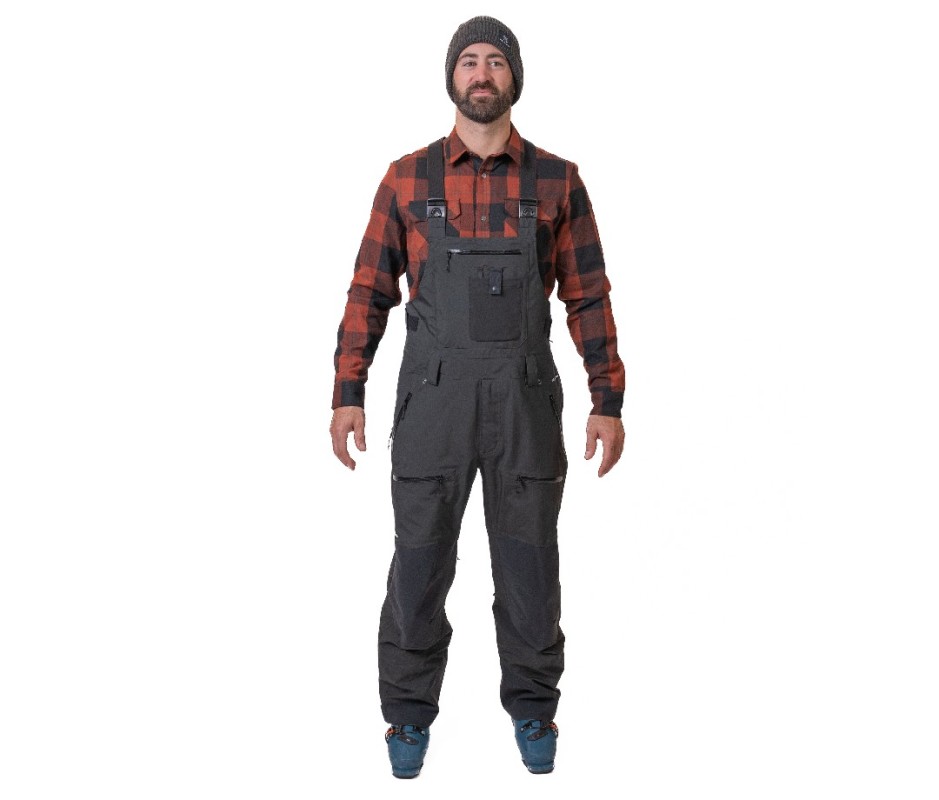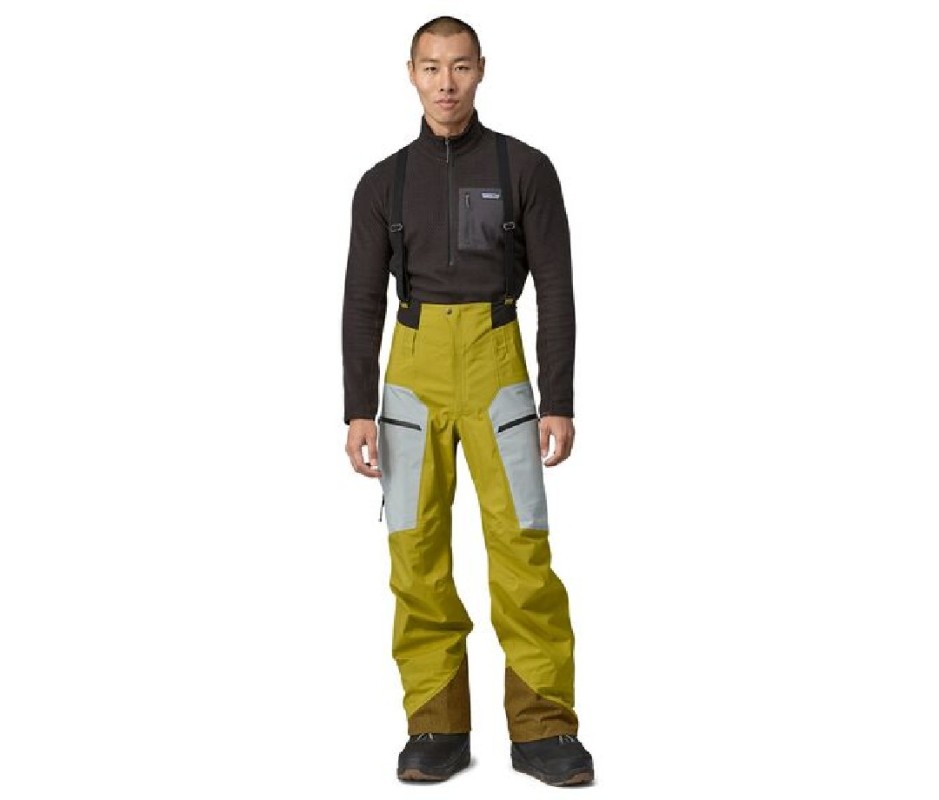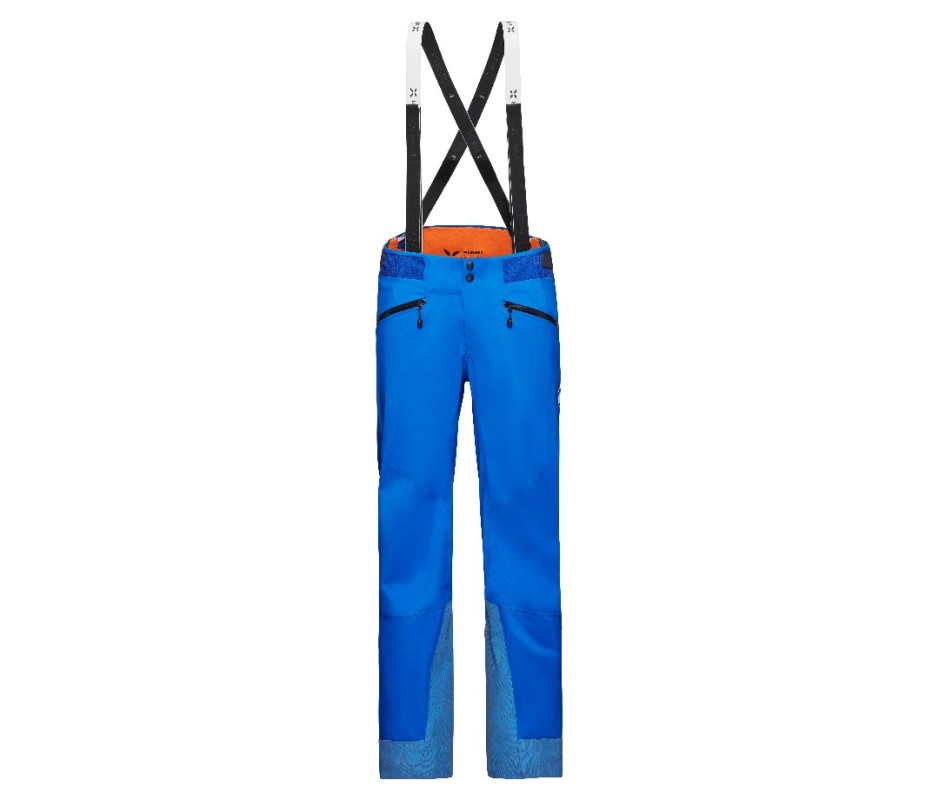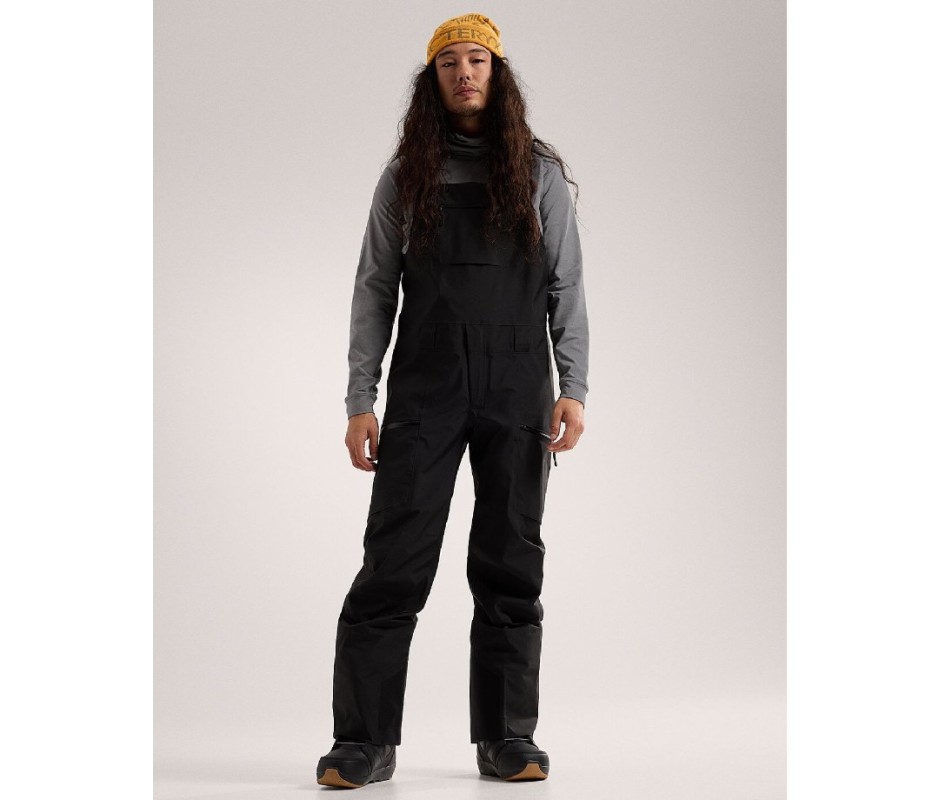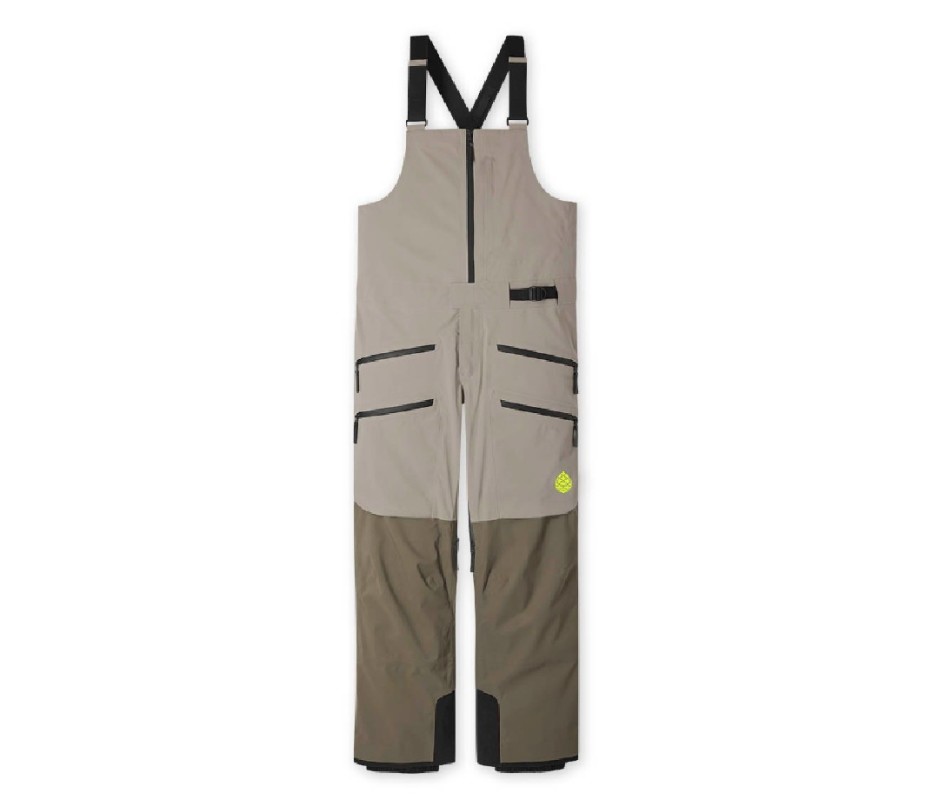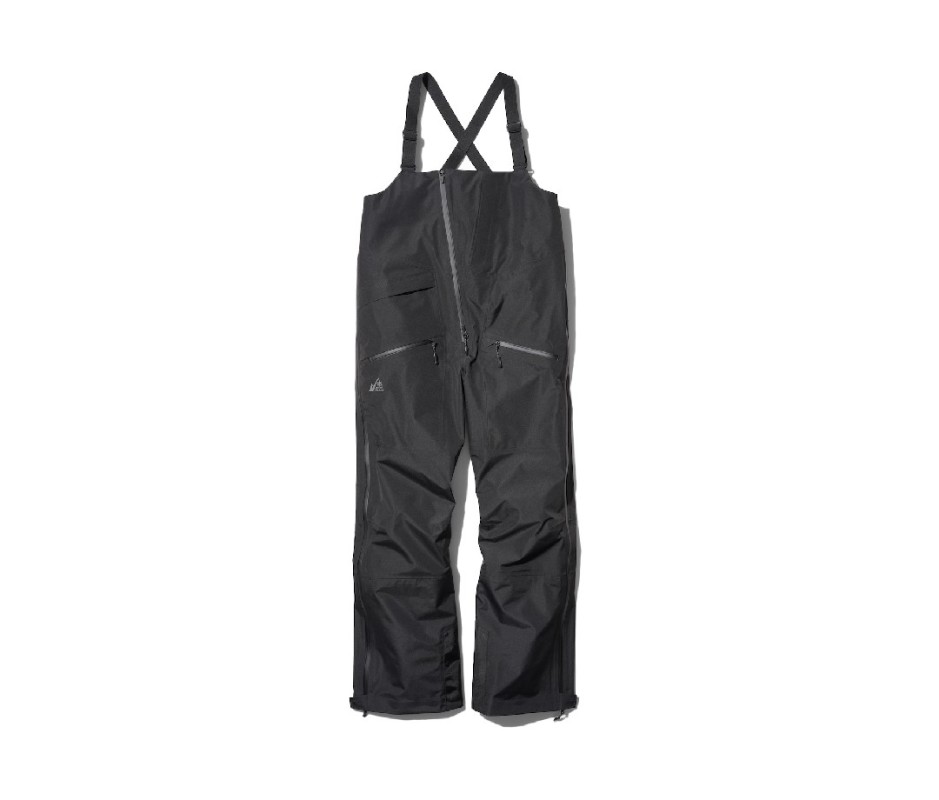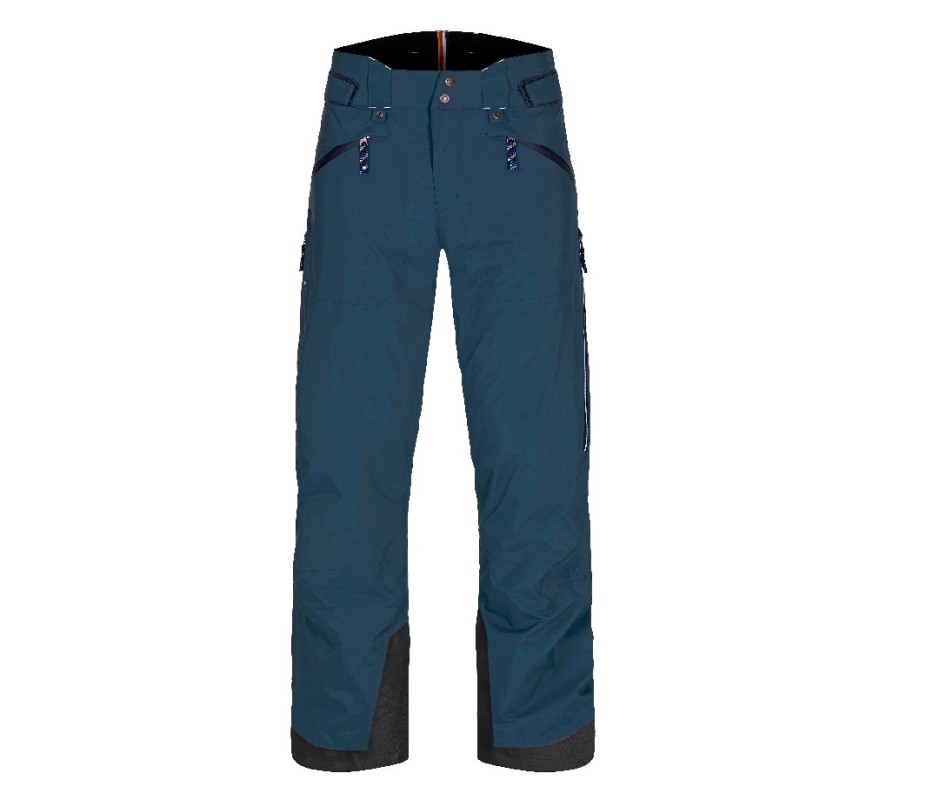[ad_1]
While jackets always get a well-deserved amount of scrutiny, we think that ski pants need to be taken more seriously. Not only do pants get the most abuse of your kit (aside from your skis), you’ll wear them for longer periods than your jacket. When you drive to the mountain, lunch in the lodge, start that uphill skin track, or jump onto the bar during a particularly festive après-ski party, chances are pretty good you’ll shed your jacket but keep your pants in place. The good news with skiwear is that designers are paying a lot more attention to your lower half.
Related: Best Small Ski Resorts to Avoid the Crowds
Ski pants and bibs are designed to take a brutal amount of abuse—that’s why we test them so hard. From adjustable waists to heavy duty reinforced boot cuffs, knees, and seat, to glove-friendly gaiters, ski pants and bibs are one of the most complex pieces of apparel you’ll ever buy. Of the top ski pants and bibs this season, our number one overall pick is the Flylow Baker Bib, a double-layer hardshell workhorse offering superior fit, protection, ventilation, and styling that our testers actually fought over for first dibs.
From full-length zippers to articulated knees, these standouts will keep you warm, dry, and comfortable all day. Testers paid close attention to venting (it’s crucial that the pant can release heat), material (waterproof/breathability and some stretch is also essential), and pockets. When you are shopping for a ski pant or bib, things to look for are length (some come in long and short), and pocket layout. If you’re backcountry skiing and carrying an avalanche beacon, pick a pant or bib that has thigh pockets with an avi-keeper strap.
Related: Powder Paradise: Snowcat Skiing at Colorado’s Purgatory Resort
The question of bibs versus pants? Bibs provide more warmth and keep out more snow. Pants are better if you run hot. Just make sure you check sizes, including your waist measurement (for pants) and pant length.
Our Testing Process: Why You Should Trust Us
Our team of nine testers knows how to do our homework out in the field. Collectively, we’ll rack up more than 1,000 on-snow days in a given season just testing out ski gear to see if it lives up to its promise. Most of us have been running ski apparel through the ringer in every type of alpine terrain and weather condition imaginable for over 20 ski seasons.
We’ve run glades, bowls, couloirs, steeps, and remote backcountry in this gear—and we’ve taken copious notes. We’ve skied the slopes of New England and Eastern Canadian hardpack, Whistler powder, Pacific Northwest cement, and everything in between, including months in the French, Italian, and Swiss Alps. We offer a combined ski history of more than 100 years of high-level race and big-mountain experience racked up from Japan to North America to the Alps—and we know exactly what we want and need from the gear we’re relying upon. We also love being dazzled and inspired by the latest, greatest ski gear innovations, which never stop.
We’ve rigorously tested and compared thousands of items, harnessing not only ambition, but wisdom and experience, with testers from their early 20s to seasoned vets. We also tested a lot of this stuff with less experienced skiers to assess their own valuable takes. It’s never easy putting so much great ski gear and apparel through its paces before whittling it all down to our favorite performers—but it’s always a ton of fun.
How to Layer for the Slopes
The ideal outfit for skiing or snowboarding starts from next-to-skin and works out. You’ll want a wool or synthetic base layer (aka long underwear). Base layers should have a fairly sleek fit, as you don’t want air between them and your body. However, if you wear your “longhandles” as a standalone layer for post-ski drinks and dinner, think about moving up a size. The midlayer you select for the day is determined by temperature and activity. Midlayers should be versatile; think vests, light sweaters, and weightless down puffys. Think of your outer layer as your ski uniform. This hardshell (waterproof and breathable nylon or polyester material) is your first line of defense against the elements.

Liam Doran
Color: How to Choose the Right Shade and Look
Color is safety in the mountains—and style-wise it’s making a comeback. Even if you lean black, brown, white, or beige in your personal color preference, know that a pop of brightness in your jacket, pants, helmet, or goggles helps you express your sense of fashion freedom, and individuality—and makes you safer.
Consider a bright jacket or pants, add a neon helmet, vibrant mittens, or a splashy neck gaiter to stick out—in a good way. Ski apparel shouldn’t be camouflage, causing you to blend in with snow, rock, cliff bands, and trees. Ideally, you won’t end up in a tree well, snowdrift, or crevasse, but bright apparel does help your friends keep track of you in the lift line and on the slopes. Those same rules apply if you’re deep in the backcountry, where visibility makes all the difference in a rescue scenario. Finally, with color, you’ll look better in photos.
You need to wear to believe. Here are the 8 best new ski pants and bibs for any skier’s wardrobe this year.
Men’s Journal aims to feature only the best products and services. We update when possible, but deals expire and prices can change. If you buy something via one of our links, we may earn a commission.
Courtesy image
Best Overall Ski Pants/Bibs of 2024: Flylow Baker Bib
Flylow, is a boutique, cutting-edge ski brand designed and manufactured by skiers. Originally based in Colorado (now spread across Denver, Jackson, and Tahoe), the brand excels at everything from ultra-hip gloves to such well-fitting bibs and jackets that testers nearly resorted to fisticuffs for first chance to test samples. The Baker Bibs are a reiteration of the time-tested original with a two-layer hardshell fabric that’s waterproof, breathable, and durable—with 40 grams of recycled insulation. They’re warm, but not sweaty, plus there are thigh vents on either side to dump excess heat. In addition to the athletic styling (knees are articulated), testers love the pockets; a big kangaroo chest and exterior phone/radio mesh sleeve, three front pockets, and one in the back. On cold days, pair the Baker bibs with the new Iceman Coat ($600). This jacket, with its stretchy, waterproof densely woven exterior replaces your shell and midlayer, as there’s a Pertex Quantum Air lining, plus 150g of 800-fill power down insulation. The Iceman is fully seam-taped, with a removable powder skirt, abundant pockets, and foot-long pit zips.
Courtesy image
Best for Mogul Mashers and Telemarkers: Patagonia Untracked Bibs
Patagonia’s Untracked Bibs feel lighter than air. They’re made from a slightly stretchy PFC-free, recycled, 3-layer Gore-Tex fabric that’s bonded to a recycled solution-dyed flannel backer. The 3-layer Gore-Tex features a durable water repellent (DWR) finish (no perfluorochemicals, of course) which makes it even less likely moisture will soak in. We like the bib’s belt loops, as it’s always nice to have the option to drop the suspenders and wear them like pants on warm days. There’s a single fly closure and drop seat—handy when you’re bundled up and don’t want to take off your jacket to remove the suspenders. Testers loved the fact that the pliable fabric never restricted movement. Articulation in the knees even provided sufficient range of motion for the telemarker in our group.
Courtesy image
Best for Glades and Backcountry: Mammut Nordwand Pro HS Pants
The high-backed Mammut Nordwand Pro HS Pants are made from the same slightly stretchy pre-consumer recycled nylon Gore-Tex Pro, with Gore-Tex Stretch mapped into areas for a bespoke fit. The fit is athletic and sleek (read not baggy), but with great range of motion for high steps, swinging ice axes and, of course, ripping down the slopes. You can keep the suspenders for added security or take them off via Velcro straps. The pants have a highly adjustable waist, so it’s easy to adjust according to what you’re wearing underneath. There are only two fairly shallow front pockets (no avi-beacon strap) and 32-inch side zippers with double heads that will enable you to get the pants over ski boots. The best in class boot gaiters and reinforced pant cuff closure had our testers singing. The elasticated gaiters can expand (via a second zipper) to adapt to wider boots, and reinforced cuffs with Velcro tabs enable tapering excess material when you’re skiing through grabby rocks and trees.
Courtesy image
Best for Snowboarders: Arc’Teryx Sabre Bib
Arc‘teryx is dipping deeper into the freeride culture with their new ski and snowboard Sabre Bib. Testers liked the big zippered chest pocket for a phone, sunglasses, or even an avi beacon (there’s an internal keeper strap). Two long zippered thigh pockets are also handy for a beacon, phone, or wallet. The classic bib design is chest-high. Belt loops let you tailor the waist more, or wear the pant with the bib section folded down. Waterproof zippers open wide for venting, and the reinforced cuff guards thwart even the sharpest of ski edges. The cut is roomy, and, in order to dial in fit, these bibs come in 12 sizes from XS to 2X with multiple length options.
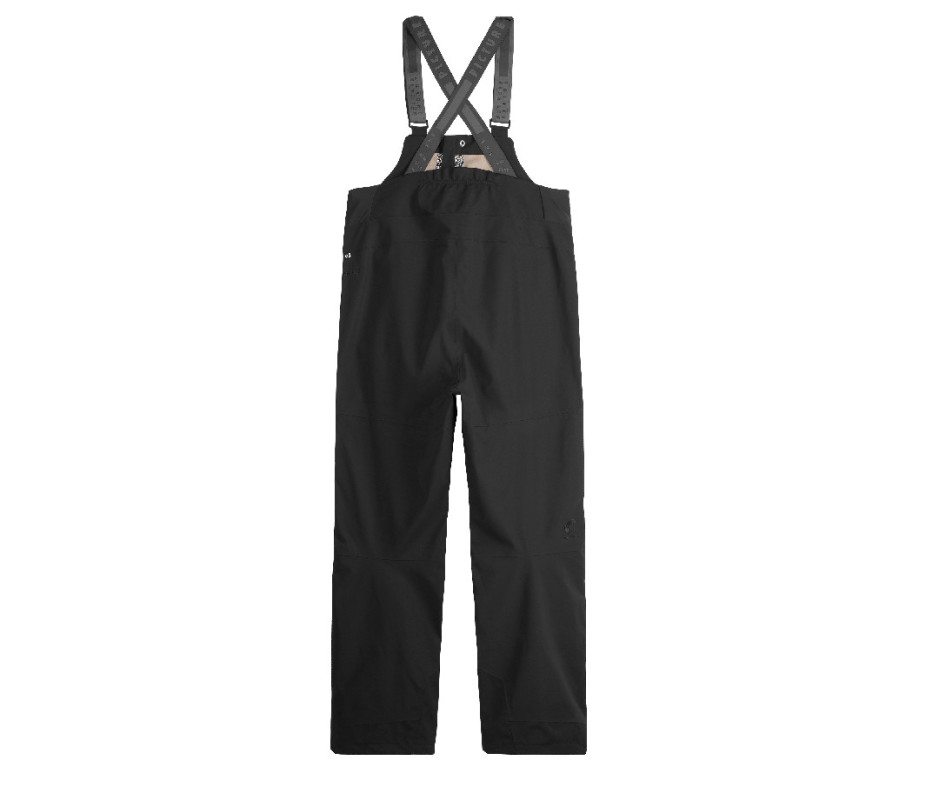
Courtesy image
Best for Sustainability: Picture Organic Clothing Welcome 3 Layer Bib
Picture’s stretchy 3-layer Welcome Bib checks all of the brand’s sustainability boxes and fit testers well. The polyester face fabric features a 20K/20K membrane with a PFC-free DWR treatment—which we tried to wet out on a rainy Oregon ski day with no success. Testers like the elasticated lycra back panel that wraps up toward your shoulder blades. It makes the bibs move with you, and cuts down on unnecessary material in the back. Seams are taped with black and white mountain prints, making the inside of the bibs a near work of art.
More Ski Pants and Bibs That We Love
Stio Figment Bib
The award-winning Figment Bib made with Stio’s proprietary 100-percent recycled 3L PeakProof fabric, are comfortable, roomy, and a veritable fortress from the elements. There are two thigh pockets with waterproof zippers. One has an avi strap, and both are bellowed at the bottom so you can stuff them with your hat or gloves. There are also two smaller slash-zippered hand warming hip-level pockets with soft fleece lining, plus a handy Napoleon chest pocket for phone or wallet. The bibs offer plenty of chest and back protection (read warmth), but you can vent with the front zipper, or pull the top part down and use the adjustable belt to keep the pants snug on the waist.
Snow Peak 3 Layer Graphene Bib Pants
Snow Peak’s 3L Graphene Bib Pants have slim-fitting legs, with a unique, loose fitting elasticated waist. Full-side zips with two-way zips for excellent venting allow you to don and doff the bibs without removing your ski boots. There’s some impressive feng shui with the pockets. The front zipper angles to the right, which makes more room for the chest pocket on the left. There are two roomy thigh pockets (big enough for an avi beacon), and a single shallow horizontal hip pocket that’s perfect for a cell phone.
Elevenate St. Moritz Pants
Ever wonder why you need to layer on so many base layers for cold days riding the lift? Probably because you’re wearing uninsulated bibs. Elevenate’s St. Moritz Pants have just the right amount of Primaloft insulation for a layer of warmth without bulk. There are zippered vents on each side for when your quads are burning. The exterior is rugged, waterproof, breathable, and windproof Gore-Tex. The pants have a stretchy internal belt that gives you about four inches of play—handy for those days when you’re layering up or down. The snow skirt marries the St. Moritz jacket with the pants via four snaps, providing the versatility of a two-piece system with nearly the protection of a one-piece suit.
[ad_2]
Source link

Hi! I’m a dedicated health blogger sharing valuable insights, natural remedies, and the latest scientific breakthroughs to help readers lead healthier lives. With a holistic approach to wellness, I empower individuals with accessible and actionable content, debunking myths and offering practical tips for incorporating healthy habits.
